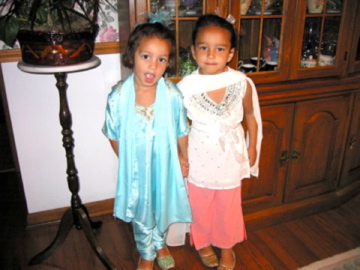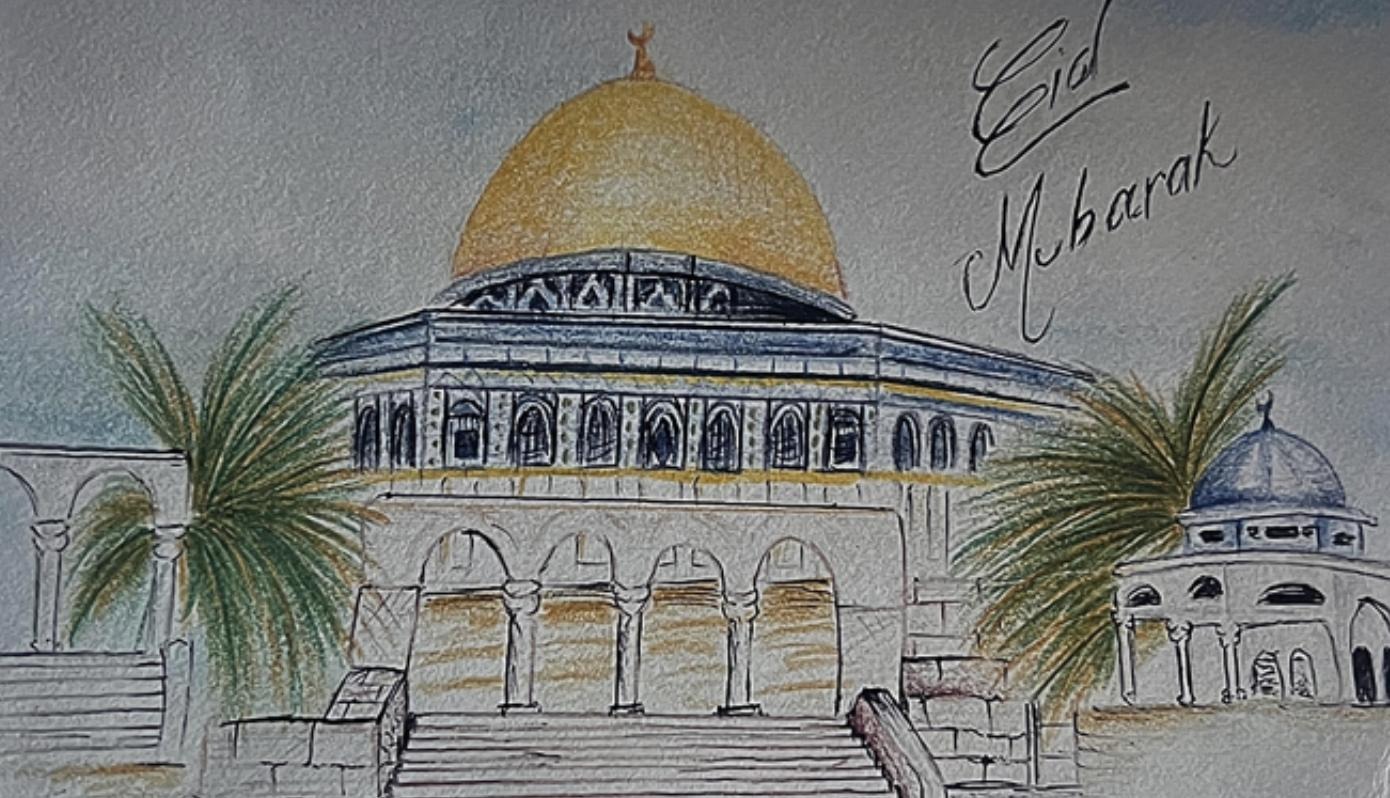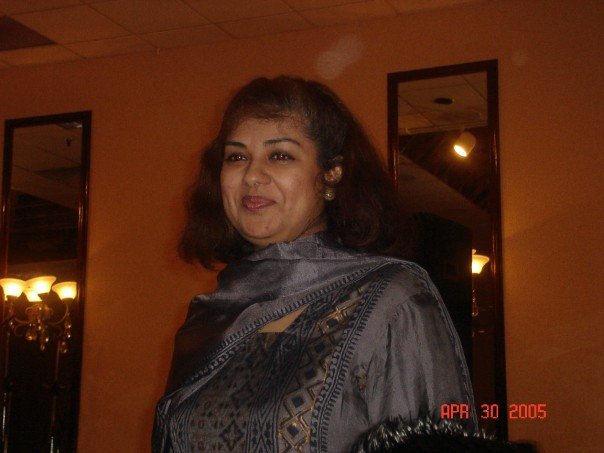'Elite' media coverage of Muslims
tends to be driven by law enforcement narratives
We don't have to rely on these media platforms to tell our stories. Our team is researching the narratives given to us about specific Muslim men -- and whether or not they've met journalistic standards -- and collecting your stories to create counternarratives.
We're asking those affected by the 'War On Terror' to send their photos, writing, and art to counternarratives2025@gmail.com for our upcoming symposium.
Read more about our wider project here.

Our roots
Growing up biracial is confusing, but growing up biracial in rural Ohio is a whole other story. My sister and I did our best to lean into our Pakistani heritage; we wore gifts from our family in Karachi, read books about Pakistan, and even took Urdu for a few years. The older I got, the more I realized how politicized that identity is. Today, I do my best to stay in touch with that side, but it’s harder the more demonized South Asian people are.
We want your photos, writing, and art.
For two years, our team, based at Syracuse University, has been analyzing agenda-setting media coverage of those targeted by the American 'War On Terror,' particularly Black, Arab, South Asian, and Muslim men who have come under scrutiny by American law enforcement. We've found that, despite objectivity being an oft-stated goal of our news systems, these men and their communities are often subject to reporting practices that end up vilifying them.
An important part of our work is making sure that counternarratives exist, particularly for those who have been portrayed as uncomplicated demons in our news and other media.
Our team is collecting art pieces, photos, poetry, short stories, and any other kinds of media about your experiences during the American 'War On Terror.' Tell us about your families and friends, your communities, your post-9/11 memories, whether upsetting, funny, or anything in between. (One of our team was asked by a middle school classmate if Saddam Hussein was her uncle; unfortunately, no photo exists.)
Send us your art, writing, or a high quality (if possible) photo, plus a short description or related story to counternarratives2025@gmail.com and, if selected, it'll be displayed at our fall research symposium in Syracuse, New York, alongside the art of political prisoners and incarcerated members of our community. (You will be compensated -- check out our FAQ section below.) None of your photos or stories will be put online without your explicit permission. We may edit displayed stories for length.

Eid mubarak -- Eid Mubarak is an Arabic, Islamic greeting which means “Blessed Feast” which marks the end of Ramadan and the fast.
Colored pencil on paper | Mohamad Shnewer
More about our work
Though the current iteration of this work has been in progress for almost two years, the thought processes behind it have been developing for more than a decade. Built atop Jesse J. Norris' idea of "conviction capitalism," as well as Mahmood Mamdani's "good Muslim/bad Muslim" concept, our work is primarily an analysis of how elite news media have portrayed three specific Muslim men: Yassin Aref, Salman Hamdani and Adel Daoud. We are interested in the narratives that were given to readers about these men, and how much those narratives relied on law enforcement's inclusion in the news stories.
Two other important parts of our work have been our oral history workshops, conducted in collaboration with Muslim Counterpublics Lab, as well as this photo stories project. Both of these serve to highlight the idea that we do not need to rely only on elite media to tell our stories, particularly when they have proven time and time again that they are not able to do the truth justice.
Our work will culminate in a symposium this fall in Syracuse, New York.
Learn more about our work and our team.

Farzana Aunty
Farzana Aunty died when she was 37, in a car accident. She was one of the many people in my childhood who taught my friends and I how to sing, how important beauty is in our faith and how to create it in community. In early 'War on Terror' times, when the mantra was, "Keep your head down," this was a rare message to receive from any adult. The same war is still raging on around us (I'm almost the age she was then, I think about this all the time), but when I sing something in jamatkhana now, and everyone sings with me, it feels like my inside and outside clicking together.
Frequently Asked Questions
- If selected, how much will I be compensated?
If selected, we will send you compensation of $50 for your submission. If you are a person who has been directly affected by the 'War On Terror' (for example, if you or a family member were incarcerated in a related case), we will send you compensation of $100. If you are abroad and we are unable to compensate you, we will donate $100 to the Coalition for Civil Freedoms in your name.
- If selected, how will you get the money to me?
A member of our team will respond to your email to us to ask for a Venmo, PayPal or Zelle account, as well as a mailing address. We will be able to compensate you through one of these methods, and we will hold on to your email address so that we can send you a copy of our zine, which will be distributed at the fall symposium. If you are currently incarcerated, our co-sponsor organization, the Coalition for Civil Freedoms, will get the money into your commisary funds. If you are currently living abroad, we will do our best to get your compensation to a family member in the U.S., and if we're not able to do that, we will make a donation to CCF in your name.
- If selected, where will my creative work be displayed?
Our team is hosting a symposium in Syracuse, New York in the fall to talk about our research. Your art will be printed and displayed at the symposium, along with any text you send us (this may be edited for length or clarity). We also hope to compile select pieces for a web archive on the Syracuse Peace Council and Lender Center websites, as well as a physical zine, which we will mail you.
- Who is funding this project?
Our research is generously funded by the Lender Center For Social Justice at Syracuse University, which supports the work of a faculty fellow every year. Learn more about our work and our team. We are generously co-sponsored by the New York Humanities Center, the Coalition for Civil Freedoms, Muslim Counterpublics Lab, and Syracuse Peace Council, who have all supported this work in different ways.
- How can I learn more about this upcoming symposium?
We'll update this site when we have the details on the symposium and the zine ready to be distributed. The symposium is invite-only for now.
- I have more questions!
Email us at counternarratives2025@gmail.com.

